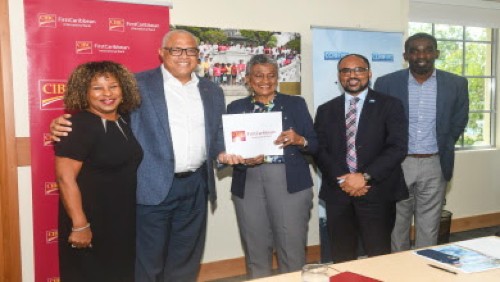Caribbean Countries to Benefit From New Grant to Enhance Disaster Preparedness
BRIDGETOWN, Barbados – At least four Caribbean countries are to benefit from a grant provided by the FirstCaribbean International ComTrust Foundation and the Caribbean Catastrophe Risk Insurance Facility (CCRIF SPC) that will help enhance rainfall monitoring systems and disaster preparedness in the Caribbean.
 The US$80,000 funds will also be used to print and disseminate copies the publication on “Hazards, Disasters and Climate Change”, developed for children ages eight to 12 years old.
The US$80,000 funds will also be used to print and disseminate copies the publication on “Hazards, Disasters and Climate Change”, developed for children ages eight to 12 years old.
The grant of US$75,000 will be used to enable at least four Caribbean countries to improve their weather monitoring networks by adding automated weather systems and other equipment to their existing networks.
These new automated weather systems (AWSs) will enhance these countries’ early warning systems and their ability to better prepare for hydro-meteorological events such as hurricanes and severe rainfall events throughout the year.
The donation from the ComTrust Foundation will support an existing initiative currently being implemented by CCRIF that focuses on providing much needed assistance to its member governments to enhance their AWS networks.
To date, CCRIF has assisted Belize, Antigua and Barbuda, Turks and Caicos Islands, and Cayman Islands, providing them with approximately US$250,000 in support to improve and expand their rainfall data collection and measurement systems.
These resources from the ComTrust Foundation will support an additional four countries to expand their rainfall monitoring networks. CCRIF will match these resources from ComTrust to support another four countries in the region.
By the middle of 2024, 12 countries in the Caribbean would have additional AWSs and enhanced rainfall measuring networks, which will help governments to better prepare their populations in the face of the increasing frequency and intensity of hydro-meteorological hazards.
In 2020, CCRIF worked with the Barbados-based Caribbean Institute for Meteorology and Hydrology (CIMH) to undertake a situational analysis to determine if there were existing gaps in rainfall measuring networks of its member governments and the extent of these gaps.
“The situational analysis, which assessed the rainfall measuring network of 19 of CCRIF member governments, indicated that only five Caribbean countries have over 70 per cent of the recommended level of AWS coverage,” said CCRIF’s chief executive officer, Isaac Anthony.
“The minimum coverage was 10 per cent of optimal coverage, the maximum was 90 per cent of optimal coverage, with an average of 40 per cent of optimal coverage across the countries. Anthony said having reviewed the report, the CCRIF board took the decision to provide support under its Technical Assistance Programme to member countries in the region to strengthen their network of automated weather stations (AWSs).
The chief executive officer of the CIBC FirstCaribbean, Mark St. Hill, said the bank is committed to maintaining strong environmental standards and to conducting activities in an environmentally and socially responsible manner that contributes to long-term value for clients, employees, communities, and shareholders.
“Climate change has been engaging our region for some time, and our bank has established itself as a leading financial partner for stakeholders seeking to address the issue. We actively seek to support the Caribbean region’s transition to a lowcarbon economy and advancing of sustainability and climate resiliency initiatives in the territories in which we operate.”
The “Hazards, Disasters and Climate Change” booklet allows children to learn about the different types of hazards that affect the Caribbean.


